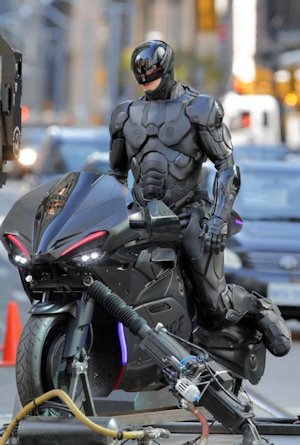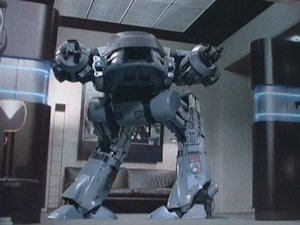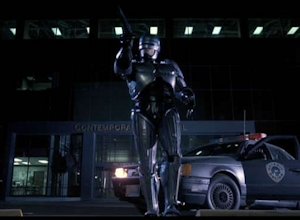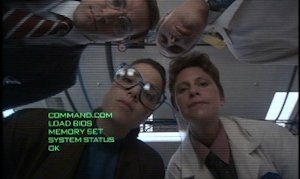Why 2014's Robocop Might Not Suck
 | | At least we know the new Robocop looks cool |
Despite things I've written in the past (and pictures I've used), I'm not opposed to movie remakes on principle. However, as I see it, remakes are usually just desperate attempts to cash in on nostalgia by getting around the whole problem of building an audience from scratch. Because of this, most remakes are of movies that were hugely successful in their time and/or have a large cult following, and the reason most remakes fail so miserably is because it is difficult to match prior success by doing the same thing twice. Therefore, a good remake needs to do one of two things: either improve upon a bad movie, or take the story in a completely different and interesting direction. After all, a built-in fanbase will be the most unforgiving about mere mimickry, so trying to please it is a fool's errand.
This brings me to 2014's remake of Robocop, Paul Verhoeven's 1987 phenomenon that spawned two sequels and is remembered fondly by most of the males of my generation. My first reaction upon hearing that the remake is in the works was equal parts surprise and disdain. Is a remake really necessary? Can the schlocky Verhoeven style translate to modern film? Why should we expect this remake to be any different from this year's Total Recall, another retooled Verhoeven classic that is by all reports a pointless imitation?
I was naturally thinking about these problems as I rewatched the original Robocop a couple of weeks ago. I have since decided that, if done properly, a modern update could actually work. The reason is because 1987's Robocop meets my criteria for being ripe for a remake: it is--and I'm truly sorry to write it--an awful film. Sure, it fits perfectly in 1987 and was an enormous success in its day, but if you can ignore your own nostalgia for an hour and a half, you'll see that it has aged about as well as Madonna. In other words, it is a pock-marked, wrinkly bag of embarrassing memories that wants to put its boney naked ass in your face and ask why you no longer adore the sight. Only by ignoring the reality of its horribleness can you see it for what it once was, so perhaps it is time to give Robocop a new coat of paint and make him do things we've never seen before.
The question, then, is what to preserve about the original, what ingredients to retain in order to justify calling this new film "Robocop." Clearly, the basic premise is a necessity: it should be about someone who is turned into a cybernetic crime fighter. In its DNA, Robocop is a superhero origin story about a man coming to grips with being something more and less than human, and those kinds of stories are always timely and popular. However, the 1987 Robocop also loosely confronted the issue of corporatism run amok by having the story set in a dystopic near future where the city of Detroit hands over its police force to unethical capitalists who build Robocop as a cost-saving measure. Though Verhoeven was deliberately tongue-in-cheek with the thematic material, the angst over government budgetary necessities and free market ethics is hardly less apparent today than it was in the mid eighties. Therefore, this political subtext should remain as well.
 | | Even for 1987, these weren't exactly cutting edge visual effects |
It is also tempting to keep the tone, to make 2014's Robocop an updated satire of violence and consumer culture. As the original demonstrates, it is entirely possible to have an unserious tone pasted over meaningful subject matter, even while confronting the audience directly about their own preconceptions (see also Natural Born Killers, Heathers, To Be or Not To Be, or Modern Times). Indeed, some of the strongest moments in 1987's Robocop are the comical commercials of the future or the ridiculously ultraviolent action scenes punctuated by one-liners. Trying to directly copy this tone, though, could be a mistake. As much as I'd love to see updated future ads and hear a new Robocop say "Your move, creep" after shooting an attempted rapist in the crotch, that wouldn't be showing the audience anything truly new. It's a tough balancing act. Change too much and you turn Robocop into a self-important and over-earnest mess that won't entertain, but keep too much and you fail to give the audience any reason to watch your remake.
One of the things that makes 1987's Robocop so memorable--and one of the things I think can be changed for the remake--is the shockingly graphic violence. Whether it's the scene where Peter Weller's character, Alex Murphy, is dismembered and killed (leading to his resurrection as Robocop) or the scene where OmniCorp's ED-209 fills a company suit with bullets and gore during a failed corporate demonstration, Verhoeven leaps over that line of tastefulness into what modern critics derisively call "torture porn." I would argue that this is an important aspect of the 1987 film, because the apparent nonchalance with which the movie treats gruesome death is directly related to the way evil corporations of the future shrug off the value of human life. Robocop is so unnecessarily violent because he reflects the attitude of the society Verhoeven is trying to parody.
 | | Some scenes are awesome enough and don't need revisiting |
This doesn't need to be the focus of the remake, though, which is why I won't get up in arms if they announce a PG-13 rating. What a modern filmmaker can do instead is focus on the more cerebral aspects of the story, tackle it on footing that is more psychological than visceral. The original movie tries (and fails, in my opinion) to get into Robocop's head, but it only does it for narrative purposes, bypassing a potentially fruitful area of thematic exploration. The violence is all about depersonalization, but it would be just as logical to deal with that issue from the point of view of a being that has become largely artificial. Indeed, extrapolating from things the director of the remake has said, this is likely the direction the new film is going to go in.
The original Robocop never fully embraces the psychological question of what happens to a person when he is reconstructed with extreme cybernetics, even though that is a major aspect of the story. Robocop gets flashes of his past life--and those flashes are what drives him to become a vigilante superhero instead of an obedient corporate tool--but the dividing line between man and machine is extremely clear and precise, whereas it should probably be a lot blurrier. 1987's Robocop starts the second act through Robocop's POV as he slowly comes into consciousness, but I think a remake that wants to get in Robocop's head should start its first act at this point in the story, leaving Murphy's death and all the other backstory to be explained later through his flashes of memory.
 | | "COMMAND.COM"? Oh, 1987, you so silly! |
Not only does this connect the audience more strongly to Robocop, but it leaves room for a third act plot twist revolving around how Murphy actually died. Instead of treating Robocop as an extension of Murphy, a character we have already met, Robocop should be treated as a completely different character, a protagonist who views Alex Murphy as somebody other than himself. In order to pull that off, the movie can't start by introducing us to Murphy; it has to start by introducing us to Robocop, leaving Murphy to be fleshed out later. Murphy, in other words, should be dead before the story begins, and the question of who he was and how he died can inform the plot in ways it never could in the original.
This brings me back to the matter of tone. If the remake goes in a more psychological direction as I have proposed, it will automatically be a more serious film. Still, it can retain its satirical backbone by having the world around Robocop be as ludicrous as it was in the original, only this time it is seen through Robocop's perspective. If Robocop thinks more like a robot than a human, it is much easier for him to notice the absurdity of the over-the-top characters he interacts with. Therefore, you have the recipe for a good remake: a film that is the same, but different.
As such, I will allow myself to be cautiously optimistic. I love Robocop, even though I've written some nasty things about it here, but I don't love it so much that I automatically consider the new version a blasphemy, over a year before it is even released. There are still plenty of ways the remake can (and is likely to) go wrong. If the director relies too much on computer graphics and mindless explosions, if he tries to shoehorn too many winks to the original in places where they don't belong, if he tries to completely abandon the original, if he demonstrates a laughable misunderstanding of the underlying science, or if he just doesn't know how to direct a big budget movie, 2014's Robocop could still be a terrible movie about which bitter fanboys will gladly say "I told you so." I, on the other hand, will dare to hope that everything goes well and Robocop winds up being at least as entertaining as it was in 1987.
-e. magill 11/20/2012
|
|